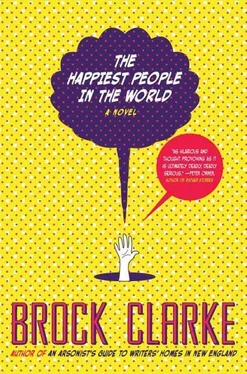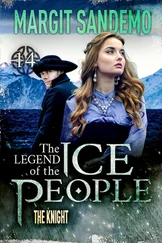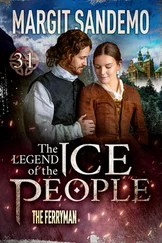“That might be a good idea,” Kurt said. His voice was strangled. It’s the way your voice sounds when you’re mad at someone for almost making you cry.
“Fair enough,” Matty said. But he was surprised when, a minute later, Kurt said, “Anything you want to tell me?”
Matty turned and saw that Kurt was looking at him with cold, tired eyes. He was like the cop in the movies who says to the criminal, I know about everything you’ve done, so you might as well just tell me about everything you’ve done.
And wow, Matty almost told Kurt. He almost said, I cheated on your mother with a woman named Locs. He almost went on through every terrible thing, every lie, every bit of deception and duplicitousness and doubt. And Matty actually might have done it, too. He might have told that story, if it had ended with, And that’s why your mother died. That’s why every single person in that room except for me and you and Henry died, and I’m sorry, because really, if you look at it a certain way, if you look at it a lot of certain ways, if you look at how it began and who it started with, then it started with me, and it’s my fault that your mother was killed, and I would do anything to change that, but I can’t, it’s my fault, I’m sorry, please forgive me. Matty might have actually told that story, if it had ended there. But it would not have ended there. It would have gone on, into the hospital room, when Kurt had caught Matty crying and Matty had said he’d been thinking about Ellen, which was not true. He’d thought and cried plenty about Ellen, just as he’d thought and cried about his brother, his poor, weird brother, whom he’d never loved well enough. And he’d thought and cried plenty about Kurt himself, Kurt, whom he’d turned into a half orphan, Kurt, who clearly would have been better off if Matty had been killed and Ellen had lived. But in the hospital room that day, Matty had not been thinking of any of those things, nor of any of those people. No, he’d been thinking about Locs, about the first time he’d kissed her; he’d been thinking about how he really did love her; he’d been thinking about how all of this could have been avoided if he’d just gone ahead and done what he’d promised Locs he would do, and that if he’d done that, everything and everybody would have ended up just fine. That’s what he’d been crying and thinking about in the hospital room that day. That’s where the story would have ended. And Matty just couldn’t tell Kurt that story. He looked away from Kurt and out the window.
“That’s gotta be wheat,” Matty finally said, and neither he nor Kurt said another word until they reached Skagen.
When they got to Skagen, Matty wondered aloud, “Well, what now?”
Kurt shrugged. It was his first moment of indecision this entire trip, if you could call what they were on a trip. They were sitting in the car, at a red light. Off to their right was the harbor, which was also, apparently, known as a havn. There were no boats in it. It was too late in the season. The little waves washed over the slips. Somewhere a bell made its lonely clanging sound. The rain had turned to snow. “I hear,” Kurt finally said, “that they have good hot dogs on the pedestrian mall.”
So they parked their car and walked to the outdoor pedestrian mall. In the middle of it was the hot dog stand. It served a dozen different kinds of hot dogs. The descriptions of the dogs were in Danish, but the names of the dogs were in English. There were French hot dogs and German hot dogs and also Chicago hot dogs and New York hot dogs and, of course, Danish hot dogs. Matty and Kurt each had two of those. Basically they were hot dogs. But they were very good. Matty and Kurt ate them while sitting on the bench and watching the pedestrians: there were more people in the mall than boats in the havn, but not many more. When they finished their dogs, Matty got up to get them two more. And that’s when he saw Henry. He turned to see whether Kurt had seen him, too. Kurt had: he was already on his feet. Henry was walking in the direction of their car. They followed him, keeping twenty, thirty feet back. The wind was up and with a clang it knocked over a metal sandwich-board sign. Henry wheeled around and Matty and Kurt ducked into a doorway. Too late, Matty thought. Matty thought that Henry must have seen them, but maybe not: he kept walking in the same direction, at the same speed, until he reached a car that was parked a couple of blocks away from theirs. Henry got in and drove off. Matty and Kurt ran to their car, jumped in, tried to follow. It seemed as though they had lost Henry, but Kurt kept on the main road, which was called Oddevej. The water was still off to the right, but Matty couldn’t see it until they went around the traffic circle, following the sign pointing toward Grenen. Suddenly there was ocean; suddenly there was sand. It was not even four o’clock, but the sun was almost gone. Soon the road was gone, too. It ended in a parking lot. Out of the parking lot was a path that led, it seemed, through the dunes. They parked their car right next to the car Henry had been driving. He was not in it. But he’d stuck a parking pass on the dashboard. The parking pass had come from a machine near the mouth of the path. Jesus, the man is being chased and he stops to make sure he isn’t parked illegally. What a. ., Matty started to think, until he noticed that Kurt was doing the same thing. Oh, buddy, he thought, and he smiled at his good son, and then his son caught him smiling and said, “What?” not smiling.
“Nothing,” Matty said. Kurt stuck the pass on the windshield of their car, and then they walked toward and down the path, which led to the beach, which then led to a long, long spit of land. Matty could barely see the end of it in the light. But he could see a human being between the end and them. Matty and Kurt walked toward the human being, who was looking out at the waves, the dying sun, the tankers way, way off in the distance. “Henry!” Matty called out when they got a little closer. Henry turned to face him. Matty kept walking, and as he did, he keenly felt his bullet scars: one on the right side of his rib cage, one in his right calf. No one had seemed to know whether Henry had been shot. Even if he had, the wounds couldn’t have been so bad. He’d gotten away, after all, out of Broomeville and all the way here. But now Matty was near enough to see Henry’s face. God, he’d lost a lot of weight. It looked as though his cheekbones were the only things preventing his face from pouring into his neck. He smiled sadly at Matty. The last thing Matty had heard Henry say was, “Please just kill me.” Matty knew Kurt had dreamed of doing just that. Matty had dreamed of it a few times himself. But now he wondered, Are we really going to do this? Is there a point in killing someone who is worse off than you? Because Henry was clearly worse off than Matty. Henry was all alone and Matty was not; Henry had lost everything, but Matty still had Kurt. So Matty was going to say to Kurt, Let’s just go home. And because Matty was Kurt’s father, Kurt would listen to him. He would give Matty the gun, and Matty would throw it into the water, and then they would go home. But before they did, they would look at the pretty scenery. “It’s really beautiful,” Matty said to Henry, and Henry smiled a little less sadly and turned, and they watched the waves from two different seas crash into each other over and over and over again. It was difficult to watch something that beautiful and eternal without thinking that everything really was going to be just fine after all.
“Turn around,” Kurt said. “Both of you.” Matty could tell from Kurt’s voice that he was pointing his gun at them. Matty looked at Henry, and Henry nodded, and then they did what Kurt had told them to do. Kurt was standing not five feet away from them. Both of his hands were on the gun, his right index finger curled around the trigger. Even in the darkness, Matty could see that his son did not look scared or angry. He looked like a man who was totally prepared to shoot two men who deserved it. “Kurt,” Matty said, but Kurt wagged the gun as though to say, Don’t. That was fine. Matty didn’t know what he’d been about to say anyway. He tried to think of something fatherly and authoritative. Put the gun down, Kurt, we’ve all suffered enough, he wanted to say, but Kurt would probably think that wasn’t even close to being true. Is that thing even loaded? Matty thought to ask, except that he was leery of the way Kurt might try to answer that question. Come on, buddy, he thought of saying, let’s just go home. That sounded better. He almost said it, too. But then Matty thought of home, where every little thing would remind him of all the lives he’d ruined or ended, where everything — the school, the bar, the diner, the woods, the woodstove — would make him think of his brother, of Locs, of Ellen, and now of Kurt, who hated his father so much that he’d wanted to shoot him to death on a beach in Denmark, because his father deserved it and would always deserve it.
Читать дальше












